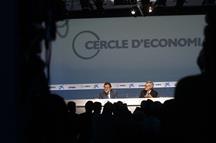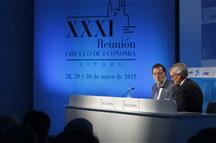"There are indeed some things we need to change and we will change them, just not in terms of our economic policy", says Mariano Rajoy
President's News - 2015.5.30
Meliá Sitges Hotel, Sitges (Barcelona)
At the start of a speech he gave to the Círculo de Economía, the President of the Government of Spain, Mariano Rajoy, highlighted the improvement seen in the Spanish economy over the last three years. He explained that his intention was always to reject any overseas bailout "because that is what we believed in, because we were confident in what we doing and because we were fully aware of the social consequences any such action could have".
Mariano Rajoy said his economic policy comprised five key factors: two that depended on Spain and three that depended on the European Union. The first two were: fiscal consolidation, made more difficult during a period of economic recession; and structural reforms. The three that depended on Europe were: structural reforms; greater economic integration; and a solution to the financing and economic liquidity problems.
The main economic imbalances have now been corrected
The President of the Government believes that the results of this policy are clear to see in the Spanish economy given that the main imbalances have now been corrected: the public deficit has been reduced from over 9% to 4.2%, the target for 2015; the CPI has fallen from 3.2% to -0.2% in the last 12 months; the foreign trade sector is performing well and setting new records; the Spanish financial system has been cleaned up, as shown by the ECB stress tests; and both households and companies are reducing their debt. In short, he added, "we are laying solid foundations for achieving sustained and stable economic growth in the future".
 Pool MoncloaAs regards economic growth, the President of the Government stressed that Spain came out of recession in the third quarter of 2013 and that the country grew by 1.4% in 2014. For 2015, the forecast is for last year's figure to double as "we are going to be the leading Eurozone economy".
Pool MoncloaAs regards economic growth, the President of the Government stressed that Spain came out of recession in the third quarter of 2013 and that the country grew by 1.4% in 2014. For 2015, the forecast is for last year's figure to double as "we are going to be the leading Eurozone economy".
The basic pillars of the Welfare State have been maintained
Although he admitted that unemployment continues to be "the top and most pressing problem for Spain", Mariano Rajoy stressed that net employment was created in 2014 - something that had not happened since 2007 - and 2015 "will see at least 600,000 more people in work". In this regard, he is convinced that the unemployment and Social Security data for May due to be released on Tuesday "will be great news for us all".
The President of the Government said that turning the economic situation around "was very tough for everyone" because some difficult decisions had to be made. However, he added that the Government of Spain drew certain lines in the sand: pensions were untouchable (almost 40% of the State Budget); no-one who had lost their job was to be abandoned by the roadside (30 billion euros per year is spent on unemployment benefits); and the main public services were to be maintained (healthcare, education and social services). In other words, despite serious difficulties, "Spain maintained the basic pillars of the Welfare State, something that was very important and should be reflected upon positively as we move forward".
The top priority must be job creation
Furthermore, Mariano Rajoy said that "the worst is behind us now but we still have many after-effects to deal with, the most important of them being unemployment". Hence, the top priority for the next legislature "must be job creation" because "employment itself is a goal and a means for the recovery to be felt by us all".
 Pool MoncloaThe President of the Government explained that "we need to grow during the next national legislature, two million jobs at least, and I believe that is possible". That would return us to pre-economic crisis employment levels, which would allow spending on fundamental public services to be maintained and improved. The only way to achieve that is to persevere with the current economic policy, maintain the public deficit reduction efforts and continue with the reforms already under way (regional financing, administrative reform, commitment to innovation and political reforms). As regards the EU, Mariano Rajoy explained that Spain is committed to "more and better Europe".
Pool MoncloaThe President of the Government explained that "we need to grow during the next national legislature, two million jobs at least, and I believe that is possible". That would return us to pre-economic crisis employment levels, which would allow spending on fundamental public services to be maintained and improved. The only way to achieve that is to persevere with the current economic policy, maintain the public deficit reduction efforts and continue with the reforms already under way (regional financing, administrative reform, commitment to innovation and political reforms). As regards the EU, Mariano Rajoy explained that Spain is committed to "more and better Europe".
Furthermore, the President of the Government said that "the time has come to lower taxes". Tax reductions began this year and will continue next year. "I must say that revenue is going well this year, quite a bit better than last year, despite the fact that taxes were lowered this year", he said.
We have the chance to enjoy a long-lasting cycle of economic growth
On the subject of the elections held on Sunday, Mariano Rajoy admitted disappointment and recognised that "there are things that we did not do well". For that reason, he expressed a willingness to make changes but that the economic policy would remain the same. "There are indeed some things we need to change and we will change them, just not in terms of our economic policy. We are not going to change the economic policy. We believe that would be a monumental mistake because this policy is the one creating jobs and improving the lives of people", he said.
At the end of his speech, the President of the Government said that 2015 will be a good year in terms of growth and employment, adding that if the economic policy can be maintained "we have the chance to enjoy the longest-lasting cycle of economic growth that anyone alive today has ever seen. I honestly believe that".
Reform of the public administration services and regional financing system
During the Q&A session, the President of the Government replied to a series of questions asked by Antón Costas, Chairman of the Círculo de Economía. Mariano Rajoy admitted that the issue of corruption has done damage, which is why an important legislative package was approved to combat this problem. "A step in the right direction has been taken", he said, because control has been increased. Furthermore, he stressed that the institutions made responsible for combating corruption (the Public Prosecutor's Office, the Spanish Tax Agency, judges, etc.) have acted entirely independently of one another. Pool MoncloaThe President of the Government also placed considerable importance on the public administration reform. In his opinion, progress is being made down the right path by implementing e-Government systems, scrapping many autonomous agencies and recovering control within local authorities.
Pool MoncloaThe President of the Government also placed considerable importance on the public administration reform. In his opinion, progress is being made down the right path by implementing e-Government systems, scrapping many autonomous agencies and recovering control within local authorities.
Furthermore, Mariano Rajoy admitted that the next legislature will need to undertake a reform of the regional financing model and doing so will need "us all to reach an agreement". He explained that this reform was not undertaken during this legislature because the priority was to grow and create jobs.
The future of the EU
After highlighting that the biggest change taking place in Spain is Europe, the President of the Government expressed a willingness to discuss a reform of the Spanish Constitution. However, he said that everything becomes more complicated when elections are announced for September. In his opinion, calling these elections is a mistake because "they are not appropriate" and because "they have already been brought forward twice". He once again insisted that the priority for now must be to consolidate the economic recovery, for which stability is essential.
When asked about investment in high-speed railway infrastructure, the President of the Government explained that the majority of the budget is not allocated to infrastructures but rather so-called social spending (pensions, healthcare, unemployment, education and social services), as well as servicing debt. Nonetheless, he agreed that the major high-speed railway projects that remain pending should be finished.
 Pool MoncloaAs regards the future of the EU, Mariano Rajoy defended the continued presence of both Greece and the United Kingdom because "it would be very bad if they left". He added that the EU is willing to help Greece but that Greece must meet its commitments. As regards the United Kingdom and the referendum announced for 2016, the President of the Government said that Spain's position will be constructive although the most constructive position should be adopted by the government announcing such a decision. "The enormous legacy that we have built over the course of more than 60 years cannot be undone", he said.
Pool MoncloaAs regards the future of the EU, Mariano Rajoy defended the continued presence of both Greece and the United Kingdom because "it would be very bad if they left". He added that the EU is willing to help Greece but that Greece must meet its commitments. As regards the United Kingdom and the referendum announced for 2016, the President of the Government said that Spain's position will be constructive although the most constructive position should be adopted by the government announcing such a decision. "The enormous legacy that we have built over the course of more than 60 years cannot be undone", he said.
Mariano Rajoy expressed satisfaction with his work as leader of the Government of Spain. "I have fulfilled my duty as President of the Government of Spain. I think I may have made mistakes and probably quite a few, but in the main I have fulfilled my duty".





